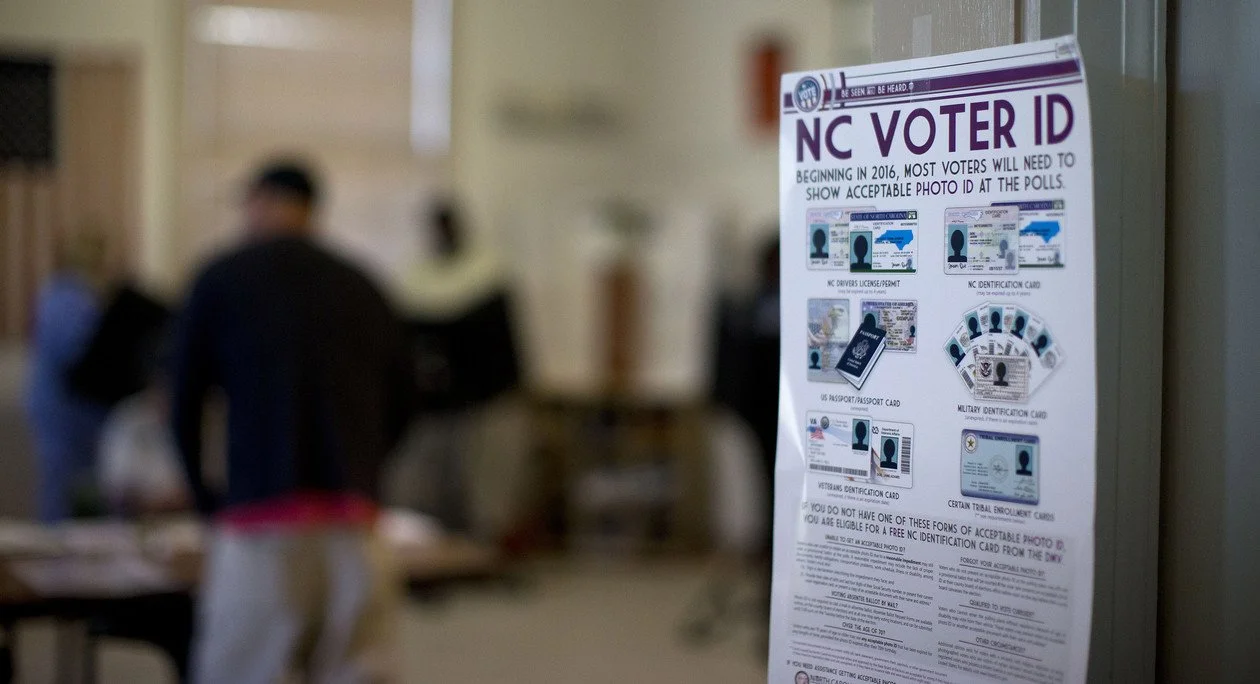Partisan Politics or State Inadequacy?: The GOP’s Request for Voter I.D. Intervention Reaches the Supreme Court
The United States Supreme Court heard arguments on March 21st regarding the permissibility of Republican lawmakers to intervene in a Voter I.D. court case. Source: AP Photo
On Monday, March 21st, the United States Supreme Court heard oral arguments regarding the permissibility of Republican lawmakers in North Carolina to intervene in defense of S.B. 824, a voter identification law passed in 2018. The debate over who obtains the authority to represent the state — currently surfacing in the nation’s highest court — supplements a long string of voting conflicts arising in the Tarheel State over the last year. More broadly, the case Berger v. North Carolina State Conference of the NAACP portrays an overarching struggle for political power between the GOP-dominated legislature and the Democratic Governor and Attorney General.
The decision by Republicans to instigate a court battle originates from the passage of Senate Bill 824, better known as “An Act to Implement the Constitutional Amendment Requiring Photographic Identification to Vote.” In November 2018, the North Carolina electorate approved a state constitutional amendment that would “require that citizens show an acceptable form of identification when voting” — S.B. 824 became the mechanism for guaranteeing the execution of this new mandate. A political battle between the state’s executive and legislative branches resulted in lawmakers overriding Governor Cooper’s veto of S.B. 824 and affirming the bill as a law. However, defensive measures by the NAACP were instituted almost immediately, with the organization's legal representatives claiming the law disproportionately impacted Black and Latino voters, citing violations of both the 14th and 15th Amendments of the U.S. Constitution, as well as Section 2 of the Voting Rights Act. Less than a month later, Senator Phil Berger and Representative Tim Moore petitioned the U.S. District Court for the Middle District of North Carolina to enact Rule 24 of the Federal Rules of Civil Procedure. In essence, Rule 24 allows those holding an “interest relating to…the subject of action,” to intervene in the matter. The two Republican representatives justified their request by contending that Democratic Attorney General Josh Stein, the current defendant, has done a lackluster job at conveying the interests of the state. Despite their assertions, federal judges at the U.S. district level twice rejected their requests on the basis that Stein was dutifully executing his role. Judge Pamela Harris of the U.S. Court of Appeals for the 4th Circuit, writing for the majority, affirmed the lower court’s decision: “it follows that they have a right to intervene…only if a federal court first finds that the Attorney General is inadequately representing…a finding that would be ‘extraordinary.’”
The fundamental question argued at the United States Supreme Court last week was quite perplexing to the justices. In response to Attorney David Thompson's opening statements in favor of the Republican lawmakers, Justice Sotomayor insisted that “[she] still doesn’t understand what the conflict here is,” especially considering that the Attorney General has the “same position” as the GOP-dominated legislature. While numerous justices echoed Sotomayor’s perspective, Justice Breyer and Chief Justice Roberts both expressed their support of the state representatives, emphasizing the “pretty strong interest” of a state’s legislature vis-à-vis election laws. The ultimate verdict of the court is likely to align with the plaintiffs — Senator Berger and his colleagues — rather than the North Carolina NAACP, as indicated by the prevailing sentiments during oral arguments. Yet, Sarah Boyce, an attorney from Stein’s office, is optimistic that the courts will side with Stein, proclaiming that the Attorney General is “adequately defending the Voter ID law.”
Republican attitudes regarding this case remain uniform — most every GOP representative supports the efforts of Berger and Moore in achieving a status of authority. On the other hand, Democratic figureheads, such as Governor Roy Cooper and Attorney General Josh Stein, have remained steadfast in their opposition to the Republican lawmakers requests. They, along with other members of their party, are confident in the legitimacy of Stein’s litigation strategy and have applauded the decisions of the lower federal courts. The State Board of Elections, a group of officials appointed by Governor Cooper, argues that a ruling favoring the plaintiffs “would breach [the] constitutional line” of separation of powers between the branches. Conversely, Thompson takes a more nuanced approach, claiming “[the legislature] is a separate, co-equal branch of government.”
At face value, this conflict might appear as no more than a partisan power grab at controlling the status of S.B. 824 — a frequent occurrence in our contemporary political system. Yet, the effects of this case are more pivotal and far-reaching. If a Supreme Court decision favors Senator Berger and Representative Moore, the legislature will be granted broad autonomy regarding intervention in future cases. A move in this direction might blur the lines between the roles of the Legislature and the Executive, and thus create a more nebulous governmental landscape. Additionally, other state legislatures might feel compelled to mirror the actions of North Carolina in establishing Rule 24 as a legitimate mechanism for intervening in high-profile cases — cases which could determine the fate of contentious policies and boost the political image of those involved.

